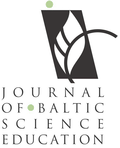SCIENCE AND COMMUNICATION: HOW TO TRANSFER KNOWLEDGE?
| Title | SCIENCE AND COMMUNICATION: HOW TO TRANSFER KNOWLEDGE? |
| Publication Type | Journal Article |
| Year of Publication | 2014 |
| Authors | Lakhvich, T |
| Journal | Journal of Baltic Science Education |
| Volume | 13 |
| Issue | 5 |
| Start Page | 592–595 |
| Pagination | Continuous |
| Date Published | October/2014 |
| Type of Article | Editorial |
| ISSN | 1648-3898 |
| Other Numbers | ICID: 1129089 |
| Keywords | problem of communication, teaching foreign students, understanding of semantics, visualization |
| Abstract | A couple of months ago I came back to the University after vacations: well rested, full of ideas and having strong desire to tell the students everything I knew about my “beloved” organic chemistry. The counterpart was even better (in all the cases they were younger: “cela se passe de commentaries”): a large majority of the students are smart, attractive, and well put together. Just seemed to be the best time and place for effective teaching-learning (as we like to say in articles) process. As usual, I had a joy during the first lecture (feeling happy of touching once more I liked so much and engaging in my own understanding of the subject) and after the first seminar where students followed generally the logics and the way of professor thinking. However, a few days later during the classes followed by the romantic period of our acquaintance I faced the problem: the students barely understood some very easy things. Not because they didn’t know, not because they were lazy, vs they could understand the more difficult things (I work at Medical University with the highest students’ percentile). They couldn’t understand very simple things because sometimes we were speaking in different languages. To some extent and in some cases, it’s a problem of interlingual interference of the mother tongue (Chittima Kaweera, 2013): one third of my students are overseas and we need to communicate in international languages like English or Russian. But misunderstanding is taking place for communication even with native speakers: and the problems are basically the same we face with foreigners. I thought about the phenomenon for years, tried to explore the problem empirically and now I’m convinced – communication is a very complex process which consists of many subunits and some of them are within the formal command of Lexis and Grammar, without taking into account, the Context. |
| URL | http://oaji.net/articles/2015/987-1450980809.pdf |
| DOI | 10.33225/jbse/14.13.592 |
| Refereed Designation | Refereed |
| Full Text |
